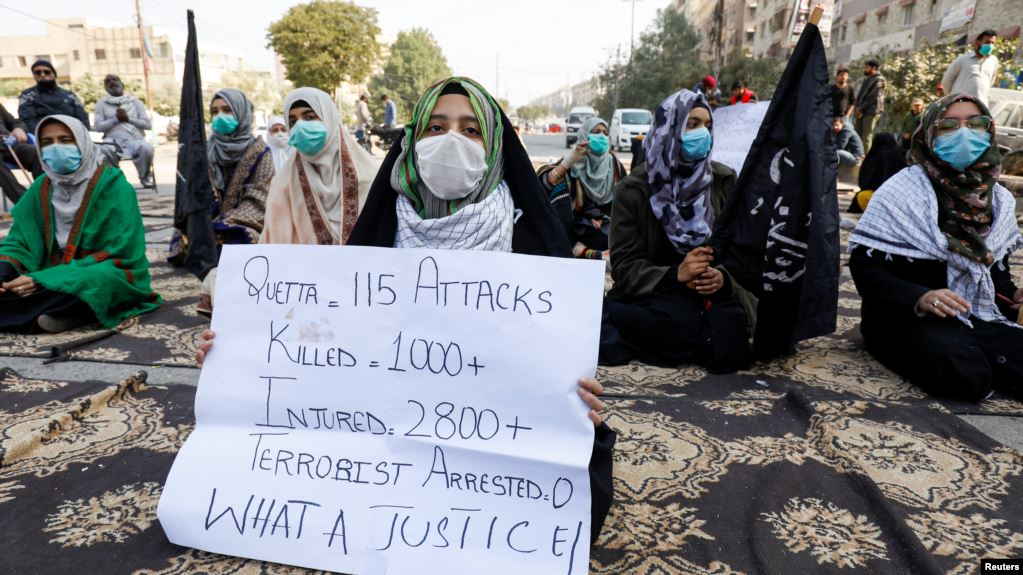Pakistani Prime Minister Imran Khan has reiterated his call on Shi’ite ethnic Hazara protesters to bury the bodies of miners killed nearly a week ago in an attack in the southwestern province of Balochistan, telling them not to “blackmail” the head of government. Khan made the comments on January 8 as sit-in protests over the killings continued for a sixth day in and around the provincial capital, Quetta, and the port city of Karachi, disrupting air, railway, and road traffic. Demonstrations calling on the federal government to ensure the security of the Hazaras were also held in the country’s northwest.
PM Imran Khan Statement
Thousands of people have rallied since 11 coal miners were found beheaded some 50 kilometres from Quetta early on January 3, in an attack claimed by the Islamic State (IS) extremist group. Despite freezing temperatures, residents and relatives of slain miners have set up a makeshift camp on a highway on the outskirts of Quetta. The demonstrators are refusing to bury the victims until, among other things, Khan visits the protest site and guarantees their protection. But during a ceremony in Islamabad on January 8, Khan warned: “You don’t blackmail the prime minister of any country like this.” “First, bury the dead. If you do it today, then I guarantee you that I will come to Quetta today,” he added.
Under Islamic tradition, burials should take place as quickly as possible after death. Meanwhile, as many as 25 sit-in protests were held on January 8 in different parts of the economically powerful city of Karachi, where major roads remained blocked. More than 50,000 trucks have been stranded on highways and at two port terminals for the past four days because of the blockades, Rana Aslam, president of the Goods Carrier Association. Waheed Ahmad, chairman of the All Pakistan Exporters’ Association, said more than 400 containers of fruits have been stranded on highways and warehouses. “We are at risk of a loss of around $4.6 million,” he said.
According to a spokesman for national flag-carrier Pakistan International Airlines (PIA), the protests have led to the cancellation of as many as 51 domestic and international flights. Pakistan Railways has said intercity trains have also suffered long delays. Dozens of people also staged rallies on January 8 in the northwestern city of Peshawar and Parachinar, a mainly Shi’ite town in Kurram tribal district. Shi’a have in the past been targeted in both Afghanistan and Pakistan by Sunni militant groups. Resource-rich Balochistan, which borders Afghanistan and Iran, has been plagued by sectarian violence, attacks by Islamist militants, and a separatist insurgency since 2004.
Pakistani Shi’a End Protests, Allow Funerals For Slain Hazara Miners
Shi’ite Muslims in Pakistan have ended nearly a week of sit-in protests and allowed the burials of 11 ethnic Hazara coal miners killed by militants from the extremist Islamic State (IS) group. The funerals on the outskirts the southwestern city of Quetta on January 9 marked the end of protests that highlighted the plight of the Shi’ite minority Hazara community. Tens of thousands attended the funerals at a cemetery where more than 500 other Hazara have been buried in more than a decade of attacks.
The Quetta sit-in, which continued through freezing nights, also sparked protests in other cities to demand that Pakistani Prime Minister Imran Khan visit the mourners. Khan drew widespread criticism from activists, opposition parties, and others on social media on January 8 when he called the protests a form of “blackmail.” But the countrywide sit-ins began to disperse after the government and protesters reached an agreement late on January 8. The agreement included security guarantees for ethnic Hazara and a promise from mourners that they would bury the bodies of the victims before the prime minister visited them.
After the burials on January 9, Khan travelled to Quetta and met families of the victims close to the protest site. He told them the attack on the miners was meant to stoke conflict between the two major sects of Islam, Sunnis and Shi’a, to destabilize Pakistan. The miners were captured and shot dead on January 4 in Machh, about 50 kilometres south of Quetta. Thousands of people had rallied in several Pakistani cities after the slayings to demand greater protection for Shi’ite Muslims. Burials are meant to take place as quickly as possible after death under Islamic tradition. But the protesters refused to allow the 11 victims to be buried until the killers were arrested and Khan personally visited them to assure their security.
Shi’ite Hazara has in the past been targeted by Sunni militant groups, both in Afghanistan and Pakistan. Quetta is the capital of resource-rich Balochistan Province, which borders Afghanistan and Iran. It has been plagued with thousands of casualties since 2004 linked to sectarian violence, attacks by Islamist militants, and a separatist insurgency.

